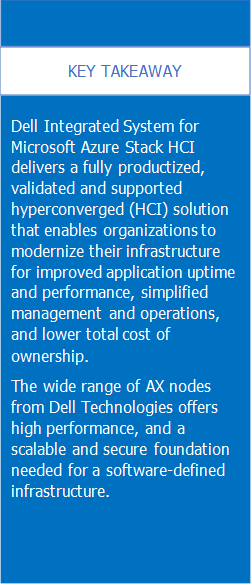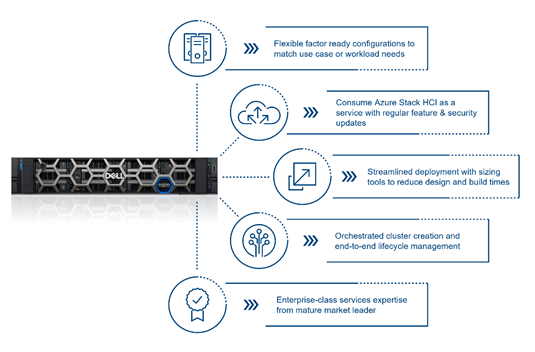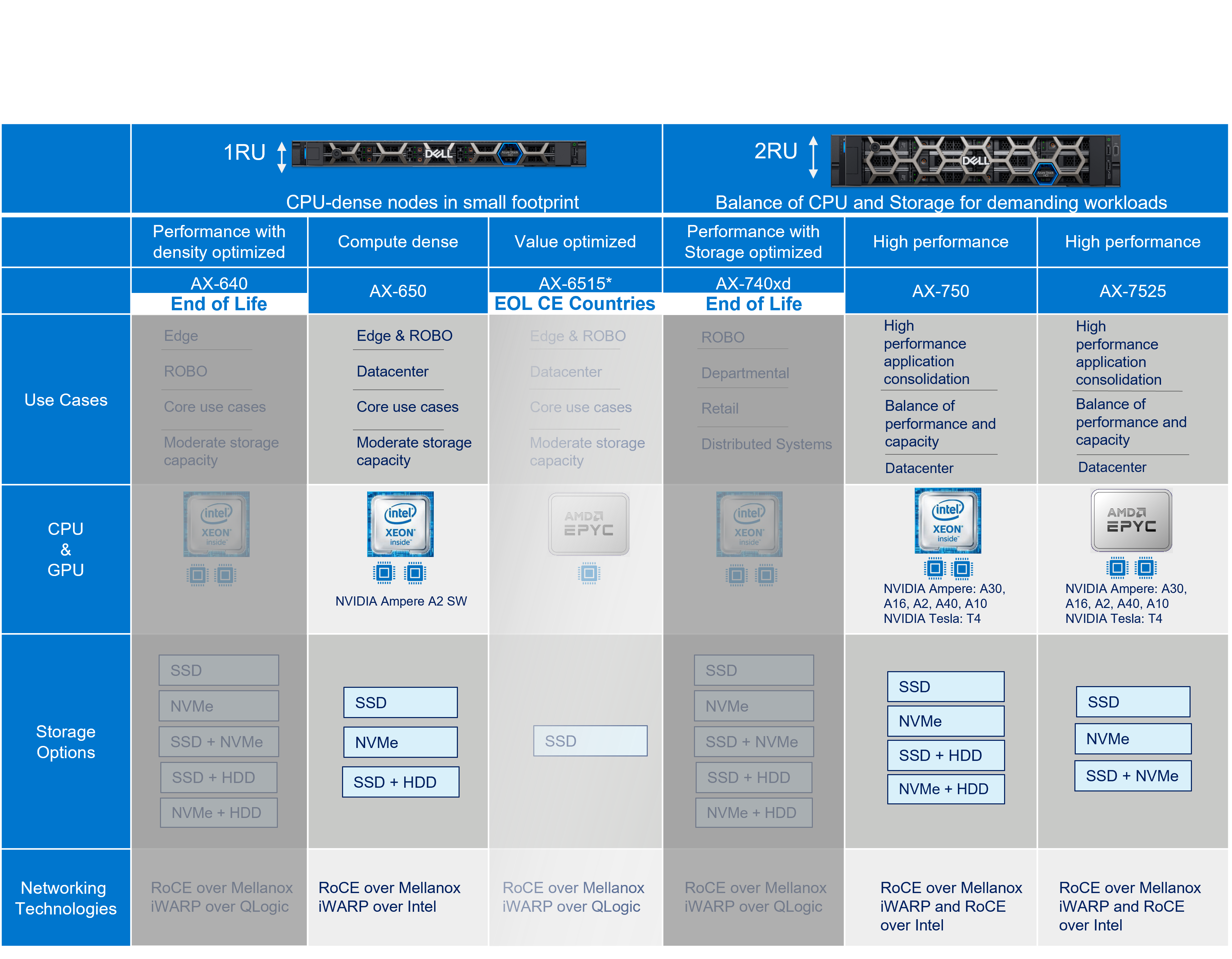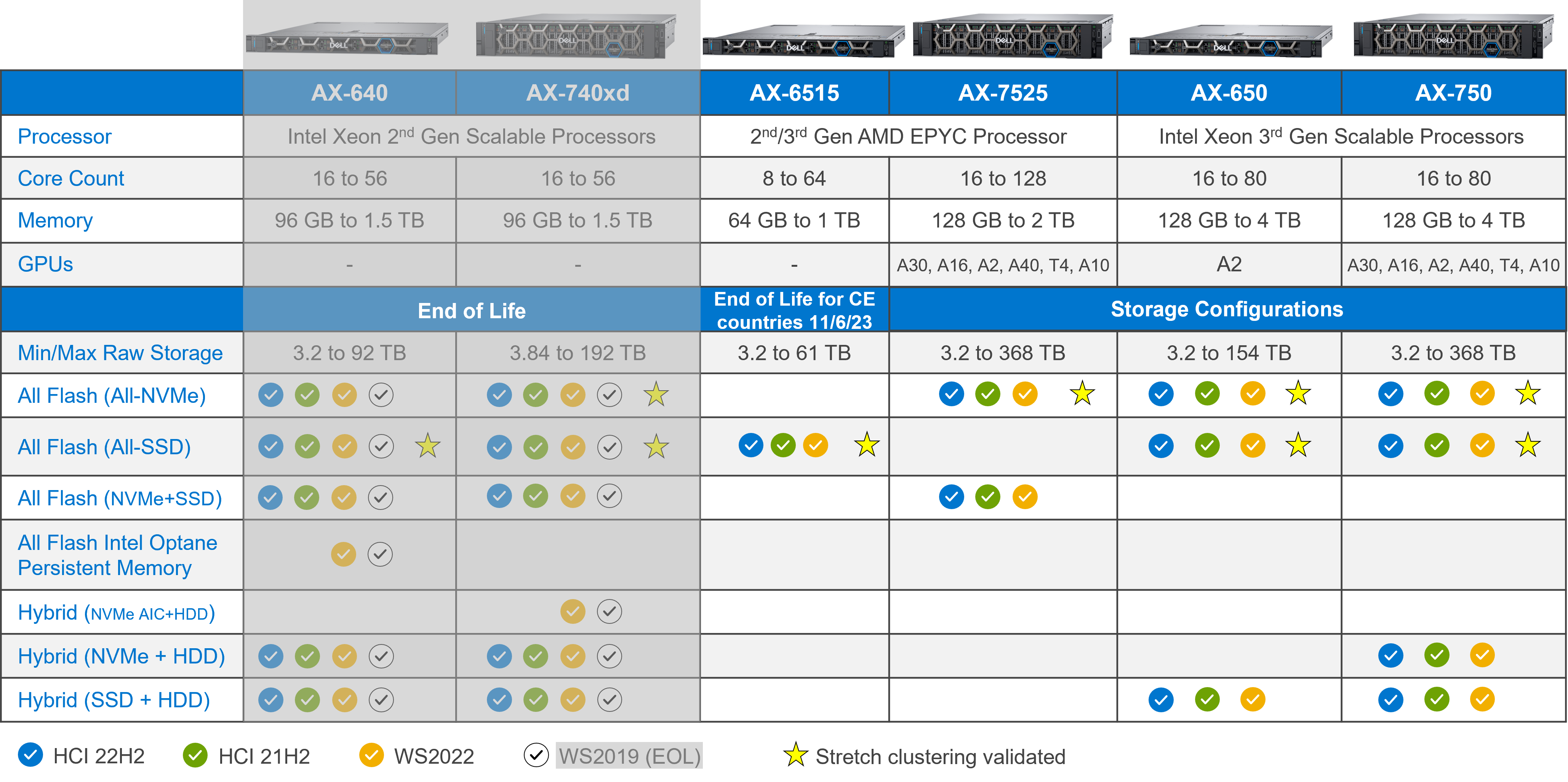 | AX nodes from Dell Technologies are intelligently designed based on the industry-leading Dell PowerEdge server architecture and are engineering validated and certified to run Azure Stack HCI. Dell Integrated System for Microsoft Azure Stack HCI offers flexible and scalable infrastructure configurations across different models for varying application performance, capacity, and application proximity requirements. In the design phase, the Dell team deliberately selects each configuration's components. Thereafter, only tested updates to the BIOS, firmware, and driver revisions are applied to the system, for performance and resiliency. The modular architecture enables a predictable pay-as-you-grow approach which aligns to changing business needs and user demands. The flexible configuration options help customers choose performance, capacity and graphics acceleration required for their business environments. Cluster sizes can range from as few as two nodes and grow to a maximum of 16 nodes. To expand beyond 16 nodes, IT staff can leverage cluster sets and benefit from Azure-like Fault Domains and Availability Sets. The form factors of the AX nodes range from one to two rack units (RU) in width and varying depth. There are different node configurations allowing for single socket or dual socket multi-core processors from Intel or AMD. Hardware innovations such as 100GbE RDMA networking and high-performance PCIe Gen 4 NVMe drives also are available. Storage configurations can be all-flash with SSD or NVMe drives or hybrid with a mix of SSD and NVMe or flash and spinning drives (HDDs). The productized AX nodes come with Azure Stack HCI OS pre-installed at the factory. Dell OpenManage Integration with Microsoft Windows Admin Center offers full support for all AX nodes and provides 1-click full stack lifecycle management (LCM) with cluster-aware updating, automated cluster creation, cluster expansion, and dynamic CPU core management. |
Through the Microsoft Cloud Solutions Provider (CSP) program from Dell Technologies, we can be your single-source of procurement and support for the entire infrastructure stack, including Azure Stack HCI software subscription, reducing time-to-value, and simplifying on-going support activities.
Organizations can benefit largely from the following with AX nodes:
Scalable and flexible configurations options
Dell offers a broad range of configuration options for the hardware where business require volumes at enterprise scale or at small scale catering to SMBs. The datacenter can be setup starting with just two nodes, and then to scale out easily as business needs grow we would three nodes and more. AX nodes are also capable of scaling up, so you can right-size the cluster for current demand and add more performance and capacity when needed. However, Dell Technologies' guidance is that all nodes in an Azure Stack HCI cluster maintain homogeneity - i.e. identically configured with all the same components and BIOS, firmware, and driver updates. All configurations designed, validated, and assured to deliver balanced performance and capacity for every possible technical use case and workloads.
Experience operational efficiency
Dell OpenManage Integration with Microsoft Windows Admin Center delivers full-stack lifecycle management enabled by Cluster-Aware Updating, easy cluster expansions and CPU core management. Updates occur with only a single reboot per node in the cluster, and there is no interruption to workloads running in the VMs. Automated cluster creation helps accelerate the process and reduce the risk of human error in deployment. The built-in disaster recovery with stretch clustering provides automatic failover to restore production quickly, and without the need for manual intervention, ensuring the system stays up and running. Unified view of system health, hardware monitoring, and firmware inventory information of the device components makes it easy for troubleshooting issues.
Get world class integrated services and support
This intelligently integrated foundation from Dell Technologies delivers simple but proven enterprise-class deployment, maintenance, and support. Services have been designed to be simple, flexible and worry free—from installation and configuration to single-source support. Certified deployment engineers ensure accuracy and speed, while reducing risk and downtime. One-stop cluster-level support covers the hardware, the operating system, hypervisor, and Storage Spaces Direct software. Dell support-offerings helps customers get ahead of problems before they happen utilizing the proactive, predictive, and automated Secure Connect Gateway for faster resolution and reporting.

Dell Technologies offers multiple configuration options of hardware that have been validated and guaranteed to deliver the optimal balance of performance and capacity to address a broad set of Azure Stack HCI use cases and workloads. Azure Stack HCI is now available on 15G configurations with the latest generation of both Intel and AMD CPUs, delivering breakthrough performance and density for use cases that include Edge, ROBO and Core datacenter locations. The table below describes in more detail six different models of AX nodes.

The AX-640 (EOL March 31, 2023) and AX-740xd (EOL March 31, 2023) are built on the 14th generation (14G) of Dell server platform powered by 2nd generation Intel Xeon scalable processors. The 15th generation(15G) of Dell Servers consist of the AMD EPYC processor-based AX-6515 and AX-7525 followed by the 3rd Generation of Intel Xeon scalable processor-based AX-650 and AX-750.
Each AX node includes one Boot Optimized Storage Solution (BOSS) card: either BOSS or BOSS-S2. This enables a RAID solution for booting the HCI OS on the AX nodes.
Stretch clustering is validated for all-flash configurations on all models and is applicable only for servers running Azure Stack HCI.

For detailed specifications on the distinct platforms, see the Dell Integrated System for Microsoft Azure Stack HCI Specification sheet.
